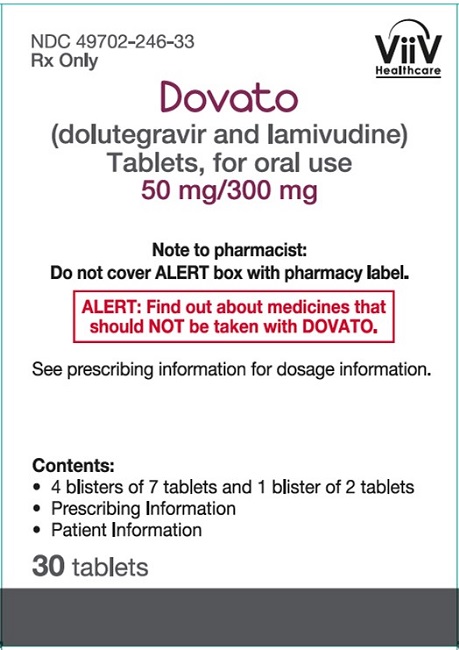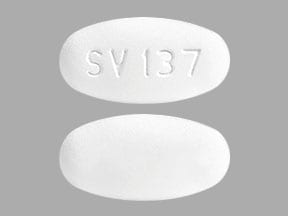Dovato
Generic name: dolutegravir and lamivudine
Drug class: Antiviral combinations
Medically reviewed by A Ras MD.
What is Dovato?
Dovato is a prescription medicine that is used without other antiretroviral medicines to treat HIV-1 infection in adults who have not received HIV-1 medicines in the past, or to replace their current HIV-1 medicines when their healthcare provider determines that they meet certain requirements.
HIV-1 is the virus that causes Acquired Immune Deficiency Syndrome (AIDS).
It is not known if Dovato is safe and effective in children.
Description
DOVATO is a fixed-dose combination tablet containing dolutegravir (as dolutegravir sodium), an integrase strand transfer inhibitor (INSTI), and lamivudine (also known as 3TC), a nucleoside analogue reverse transcriptase inhibitor (NRTI).
DOVATO tablets are for oral administration. Each film-coated tablet contains the active ingredients 50 mg of dolutegravir (equivalent to 52.6 mg dolutegravir sodium) and 300 mg of lamivudine and the inactive ingredients magnesium stearate, mannitol, microcrystalline cellulose, povidone K29/32, sodium starch glycolate, sodium stearyl fumarate. The tablet film-coating contains the inactive ingredients hypromellose, polyethylene glycol, titanium dioxide.
Dolutegravir
The chemical name of dolutegravir sodium is sodium (4R,12aS)-9-{[(2,4-difluorophenyl)methyl]carbamoyl}-4-methyl-6,8-dioxo-3,4,6,8,12,12a-hexahydro-2H-pyrido[1′,2′:4,5]pyrazino[2,1-b][1,3]oxazin-7-olate. The empirical formula is C20H18F2N3NaO5 and the molecular weight is 441.36 g/mol. It has the following structural formula:

Dolutegravir sodium is a white to light yellow powder and is slightly soluble in water.
Lamivudine
The chemical name of lamivudine is (2R,cis)-4-amino-1-(2-hydroxymethyl-1,3-oxathiolan-5-yl)-(1H)-pyrimidin-2-one. Lamivudine is the (‑)enantiomer of a dideoxy analogue of cytidine. Lamivudine has also been referred to as (‑)2′,3′-dideoxy, 3′-thiacytidine. It has a molecular formula of C8H11N3O3S and a molecular weight of 229.3 g/mol. It has the following structural formula:

Lamivudine is a white to off‑white crystalline solid and is soluble in water.
What is the most important information I should know about Dovato?
If you have both human immunodeficiency virus-1 (HIV-1) and hepatitis B virus (HBV) infection, Dovato can cause serious side effects, including:
- Resistant HBV infection. Your healthcare provider will test you for HBV infection before you start treatment with Dovato. If you have HIV-1 and hepatitis B, the hepatitis B virus can change (mutate) during your treatment with Dovato and become harder to treat (resistant). It is not known if Dovato is safe and effective in people who have HIV-1 and HBV infection.
- Worsening of HBV infection. If you have HIV-1 and HBV infection, your HBV may get worse (flare-up) if you stop taking Dovato. A “flare-up” is when your HBV infection suddenly returns in a worse way than before. Worsening liver disease can be serious and may lead to death.
- Do not run out of Dovato. Refill your prescription or talk to your healthcare provider before your Dovato is all gone.
- Do not stop Dovato without first talking to your healthcare provider. If you stop taking Dovato, your healthcare provider will need to check your health often and do blood tests regularly for several months to check your liver.
Who should not take Dovato?
Do not take Dovato if you:
- have ever had an allergic reaction to a medicine that contains dolutegravir or lamivudine.
- take dofetilide.
What should I tell my healthcare provider before taking Dovato?
Before you take Dovato, tell your healthcare provider about all of your medical conditions, including if you:
- have or have had liver problems, including hepatitis B or C infection.
- have kidney problems.
- are pregnant or plan to become pregnant. One of the medicines in Dovato (dolutegravir) may harm your unborn baby.
- Your healthcare provider may prescribe a different medicine than Dovato if you are planning to become pregnant or if pregnancy is confirmed in the first 12 weeks of pregnancy.
- If you can become pregnant, your healthcare provider will perform a pregnancy test before you start treatment with Dovato.
- If you can become pregnant, you should consistently use effective birth control (contraception) during treatment with Dovato.
- Tell your healthcare provider right away if you are planning to become pregnant, you become pregnant, or think you may be pregnant during treatment with Dovato.
Pregnancy Registry. There is a pregnancy registry for people who take antiretroviral medicines, including Dovato, during pregnancy. The purpose of this registry is to collect information about the health of you and your baby. Talk with your healthcare provider about how you can take part in this registry.
- are breastfeeding or plan to breastfeed. Do not breastfeed if you take Dovato.
- You should not breastfeed if you have HIV-1 because of the risk of passing HIV-1 to your baby.
- One of the medicines in Dovato (lamivudine) passes into your breast milk.
- Talk with your healthcare provider about the best way to feed your baby.
Tell your healthcare provider about all the medicines you take, including prescription and over-the-counter medicines, vitamins, and herbal supplements.
Some medicines interact with Dovato. Keep a list of your medicines and show it to your healthcare provider and pharmacist when you get a new medicine.
- You can ask your healthcare provider or pharmacist for a list of medicines that interact with Dovato.
- Do not start taking a new medicine without telling your healthcare provider. Your healthcare provider can tell you if it is safe to take Dovato with other medicines.
How should I take Dovato?
- Take Dovato 1 time a day exactly as your healthcare provider tells you.
- Take Dovato with or without food.
- Do not change your dose or stop taking Dovato without talking with your healthcare provider.
- If you take antacids, laxatives, or other medicines that contain aluminum, magnesium, or buffered medicines, Dovato should be taken at least 2 hours before or 6 hours after you take these medicines.
- If you need to take iron or calcium supplements, including multivitamins that contain iron or calcium, by mouth during treatment with Dovato:
- You may take these supplements at the same time that you take Dovato with food.
- If you do not take these supplements with Dovato and food, take Dovato at least 2 hours before or 6 hours after you take these supplements.
- Do not miss a dose of Dovato. If you miss a dose of Dovato, take it as soon as you remember. Do not take 2 doses at the same time or take more than your prescribed dose.
- Stay under the care of a healthcare provider during treatment with Dovato.
- Do not run out of Dovato. The virus in your blood may increase and the virus may become harder to treat. When your supply starts to run low, get more from your healthcare provider or pharmacy.
- If you take too much Dovato, call your healthcare provider or go to the nearest hospital emergency room right away.
What are the possible side effects of Dovato?
Dovato can cause serious side effects, including:
- See “What is the most important information I should know about Dovato?”
- Allergic reactions. Call your healthcare provider right away if you develop a rash with Dovato. Stop taking Dovato and get medical help right away if you develop a rash with any of the following signs or symptoms:
- fever
- generally ill feeling
- tiredness
- muscle or joint aches
- blisters or sores in mouth
- blisters or peeling of the skin
- redness or swelling of the eyes
- swelling of the mouth, face, lips, or tongue
- problems breathing
- Liver problems. People with a history of hepatitis B or C virus may have an increased risk of developing new or worsening changes in certain liver tests during treatment with Dovato. Liver problems, including liver failure, have also happened in people without a history of liver disease or other risk factors. Your healthcare provider may do blood tests to check your liver.
Tell your healthcare provider right away if you get any of the following signs or symptoms of liver problems: - Too much lactic acid in your blood (lactic acidosis). Lactic acidosis is a serious medical emergency that can lead to death.
Tell your healthcare provider right away if you get any of the following symptoms that could be signs of lactic acidosis:- feel very weak or tired
- unusual (not normal) muscle pain
- trouble breathing
- stomach pain with nausea and vomiting
- feel cold, especially in your arms and legs
- feel dizzy or light-headed
- have a fast or irregular heartbeat
- Lactic acidosis can also lead to severe liver problems, which can lead to death. Your liver may become large (hepatomegaly) and you may develop fat in your liver (steatosis). Tell your healthcare provider right away if you get any of the signs or symptoms of liver problems which are listed above under “Liver problems”. You may be more likely to get lactic acidosis or severe liver problems if you are female or very overweight (obese).
- Changes in your immune system (Immune Reconstitution Syndrome) can happen when you start taking HIV-1 medicines. Your immune system may get stronger and begin to fight infections that have been hidden in your body for a long time. Tell your healthcare provider right away if you start having new symptoms after you start taking Dovato.
- The most common side effects of Dovato include:
These are not all the possible side effects of Dovato. Call your doctor for medical advice about side effects. You may report side effects to FDA at 1‑800‑FDA‑1088.
General information about the safe and effective use of Dovato
Medicines are sometimes prescribed for purposes other than those listed in a Patient Information leaflet. Do not use Dovato for a condition for which it was not prescribed. Do not give Dovato to other people, even if they have the same symptoms that you have. It may harm them. You can ask your healthcare provider or pharmacist for information about Dovato that is written for health professionals.
How should I store Dovato?
- Store Dovato below 86°F (30°C).
- Dovato comes in a child-resistant package.
Keep Dovato and all medicines out of the reach of children.
What are the ingredients in Dovato?
Active ingredients: dolutegravir and lamivudine.
Inactive ingredients: magnesium stearate, mannitol, microcrystalline cellulose, povidone K29/32, sodium starch glycolate, sodium stearyl fumarate.
The tablet film-coating contains: hypromellose, polyethylene glycol, titanium dioxide.
Label
Principal Display Panel
- NDC 49702-246-13
- Dovato
- (dolutegravir and lamivudine)
- Tablets
- 50 mg/300 mg
- Rx Only
- Note to pharmacist:
- Do not cover ALERT box with pharmacy label.
- ALERT: Find out about medicines that should NOT be taken with DOVATO.
- 30 tablets
- Each tablet contains 50 mg of dolutegravir (equivalent to 52.6 mg of dolutegravir sodium) and 300 mg of lamivudine.
- This package is child-resistant. Keep out of reach of children.
- Store below 30°C (86°F).
- See prescribing information for dosage information.
- Do not accept if membrane seal under cap is missing or broken.
- Mfd for:
- ViiV Healthcare
- RTP, NC 27709
- by: GlaxoSmithKline, RTP, NC 27709
- Trademarks owned or licensed by ViiV Healthcare.
- ©2019 ViiV Healthcare or licensor.
- www.dovato.com
- Rev. 3/19
- 62000000031103


SRC: NLM .
